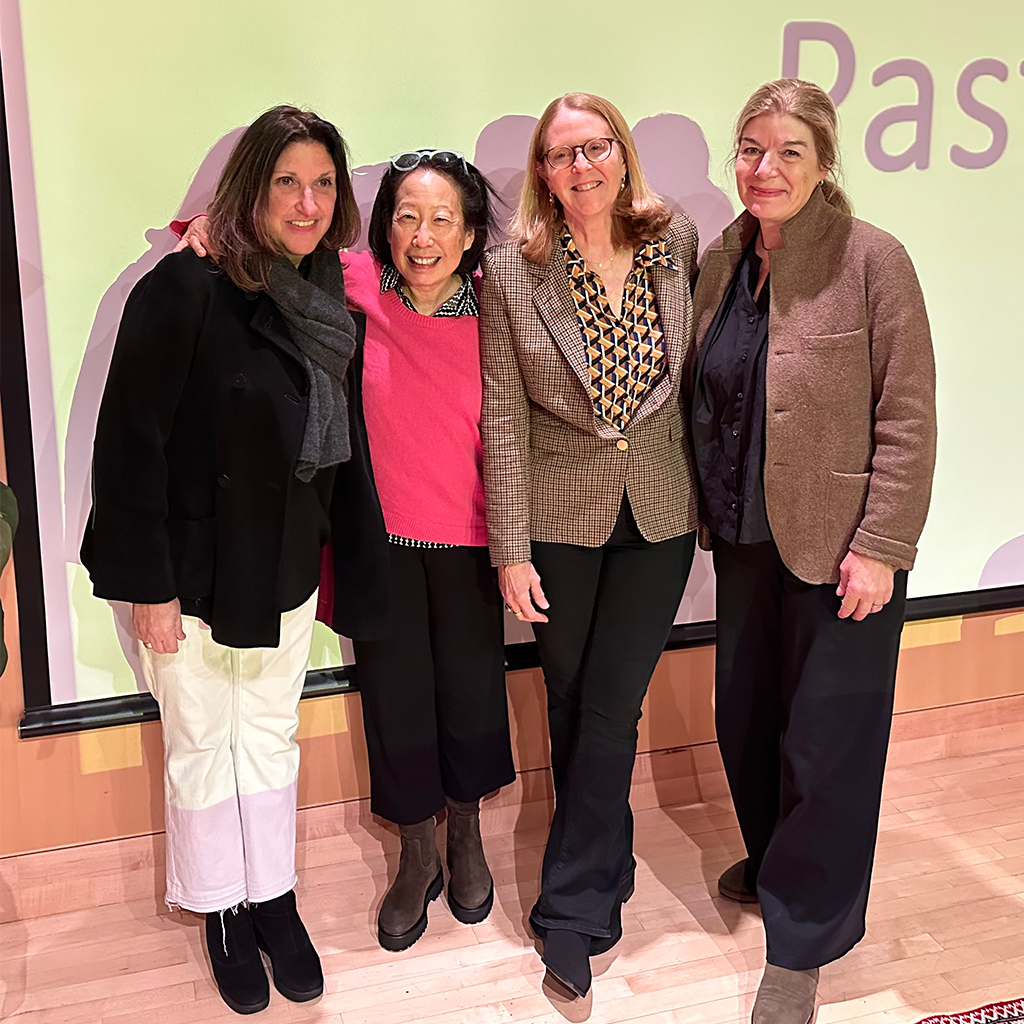For four famed women authors in library panel, Cambridge is the place and this is their moment

“Cambridge Woman Authors” panelists at the Cambridge Main Library on Nov. 6 were, from left Laura Zigman, Gish Jen, Virginia Pye and Claire Messud. (Photo: Virginia Pye)
Anne Dudley Bradstreet, Hannah Adams, Margaret Fuller and Pauline Elizabeth Hopkins connected across the centuries Nov. 6 with Virginia Pye, Laura Zigman, Gish Jen and Claire Messud at “Cambridge Woman Authors: Past and Present,” an event led by Pye. For many the historical and gendered focus of the event, held at the Cambridge Main Library under the rubric “Cambridge as Inspiration,” was a pleasant surprise and a chance to look more deeply into a subject they hadn’t thought much about.
The evening, begun with a speech by Pye and continued with questions moderated by her and split by a brief presentation about the historical female authors, was slightly derailed, but in a positive way: The panelists, some of whom had been friends for more than 20 years, opened up about their lives as writers – and female writers – as well as on Cambridge as an inspiration.
For Jen, for example, Cambridge has proven supportive. She joked that if someone approaches her and she doesn’t remember their name, she can always ask, “How’s your book coming along?” Nine times out of ten, this approach works, because the city has a huge writing community. “In Cambridge, writing a book seems like the most normal thing to do,” Jen later told Cambridge Day. “Everybody gets it, they understand creative activity.”
Perhaps as a result of this warm environment, all four authors have books based in Cambridge. For Jen, a collection of short stories called “Who’s Irish,” set in a playground. Messud’s novel “The Woman Upstairs” is centered around a schoolteacher who falls in love with a visiting academic family. Pye’s new “The Literary Undoing of Victoria Swann” is historical fiction set in Cambridge, and Zigman has written two novels set here: “Separation Anxiety” and her newest, “Small World.”
Zigman has felt more supported in Cambridge than in other cities. In her time as a publicist and aspiring author in New York, she felt discriminated against as a woman due to place and era. Men publishing at the same time and publishing house as Zigman would get more resources and attention, and she felt her entire career was defined by her gender.
When Zigman’s debut, “Animal Husbandry,” came out in 1998, The Washington Post heralded it as the first of the “chick-lit” genre. While Zigman had struck big, and the book ended up getting adapted into a 2001 film “Someone Like You,” starring Ashley Judd and Hugh Jackman, she began to hate the label. “It was derogatory in a way because it was condescending, as if the book was cheap, but it was also reductive and a way of lumping us all together,” Zigman told Cambridge Day. Once she had children, and began writing about parenthood, the term became “mommy lit,” which she again both didn’t understand and didn’t like. “Why?” Zigman asked. “We’re just getting older and we’re writing about the things that we’re experiencing. Men write about stuff that they’re going through and they don’t get categorized in this way.”
For many of the speakers, the route to becoming an established author was difficult. Jen spoke to the struggles she’s faced as a Chinese-American daughter of immigrants and as a writer of color. “In my family, writing was not a legitimate activity,” she said.
Pye and Zigman simply struggled to find the right story to tell. While both started strong, with Zigman’s “Animal Husbandry” becoming a national bestseller and Pye’s first attempt getting picked up by a top-notch literary agent, things didn’t work out as planned: Pye’s agent couldn’t sell the idea, and gave the book back to her after six weeks. Zigman got breast cancer, had to move back to take care of her parents in Newton and struggled just to come up with ideas, taking what amounted to a 14-year-break other than some ghostwriting gigs. “There are just periods where you’re not going to be able to write or you’re really stuck. And the more you criticize yourself, the worse it is,” she said. “For me, it was really about taking these little baby steps to get myself writing. For instance, I know we all make fun of social media, but when I got on Instagram, I started to just write little tiny paragraphs [under photos that I posted]. And I would feel like, ‘Oh my god, I can still write.’ That’s how I had to start; it was that small.”
Today, Pye and Zigman feel they can be proud of their writing again. Pye wrote her debut novel at 53 and has written three books since, all of which have won several awards. Zigman has written two new, highly reviewed books, and has just finished writing another.
It is, panelists agreed, “the golden age” for women writers in Cambridge – an idea Pye brought up in her opening remarks and was repeated throughout the night. “I feel that we’re here tonight to celebrate the abundance of talented and significant women writers,” Pye said.
The supportive Cantabrigian writing community was seen onstage: Jen spoke of how much she loved Pye’s new book, the friendships among the four women and the very existence of an event such as Pye organized. “She’s probably the most generous of all of us,” Zigman told the Cambridge Day. “I’m a connector too. I really like to connect people. But she does it in a much more organized way.”
Virginia Pye will be at a Women’s National Book Association book sale signing for “The Literary Undoing of Victoria Swann” from 7 to 8:30 p.m. Friday at Porter Square Books, 25 White St., Porter Square, Cambridge.


